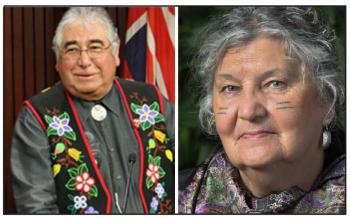Image Caption
Summary
Local Journalism Initiative Reporter
Windspeaker.com
Métis people need to leave behind the legalities and the politics when it comes to defining who they are and depend upon community—like they used to do.
“Métis is … not to me what individuals have to prove. The community is the place where this all begins and ends as far as I’m concerned,” said Tony Belcourt. “It’s the community that decides who belongs…
“As a people who have fought hard for and have finally been able to gain recognition of constitutional rights, which have meaning, then the onus is on anyone who identifies within our community, within the Métis Nation, to establish their own legitimacy to the people. Not to the government, but to the community themselves.”
Belcourt made his comments last week during a two-hour conversation with Maria Campbell on Métis identity, hosted by Athabasca University and X University.
Both Belcourt and Campbell have rich, lived political and scholarly expertise as Métis.
Campbell is a playwright, filmmaker and author, perhaps best known for her memoir Halfbreed, published in 1973. It is regarded as a critically important text on the discrimination, oppression and poverty that some Métis women have experienced in Canada.
Belcourt was the founding president of the Métis Nation of Ontario (MNO), which was one of the interveners in the Powley hunting case that went all the way to the Supreme Court of Canada. In 2003, the court set out a 10-point test—the Powley test—to determine Métis hunting rights and who is entitled to those rights under the Constitution Act 1982.
That definition of Métis is not something Belcourt agrees with because it puts the “onus on an individual to prove they are Métis, that they meet the qualifications of the test…. That in itself is causing a lot of concern and upheaval within Métis communities.”
Campbell goes a step further pointing out that the term ‘Métis’ is a government word forced upon a people in order for them to gain funding. The result was the creation of numerous Métis organizations initially set up to “make change for our people.” Campbell was secretary-treasurer of the Métis Nation of Alberta in the 1960s.
Now, however, she has harsh words for the “foolishness” of the leadership of the Métis Nation associations that span from British Columbia to Ontario.
“Every time we talk Métis it all becomes this really sick kind of politics and it shouldn’t have to be like that,” she said, fighting back tears of frustration and anger.
Belcourt said these organizations have become “bureaucratic,” serving government needs more than the needs of the people.
“I think there’s unfinished business … not so much within our communities … but it’s with the political organizations themselves,” he said.
The last few years have seen fighting among the five organizations that fit under the umbrella of the Métis National Council (MNC), with dissension focused partially on the definition of Métis and the Métis Homeland map adopted by the MNC.
The result has been the suspension of the MNO from the MNC; threats by the Manitoba Metis Federation (MMF) to pull out of the MNC; the joining of forces of the Métis Nations in Alberta, Saskatchewan and British Columbia alongside the MNO; and lack of general assemblies by the MNC.
Most recently, MMF President David Chartrand admonished the eastern Métis from Ontario for taking over the Red River Métis and their ancestors and changing the western Métis culture.
Belcourt said if people want to believe the only Métis are from the Red River “that leaves out the vast, vast majority of what we call the Métis Nation.”
Neither Belcourt nor Campbell have a connection to the Red River Métis, but they do have their own rich Métis history. For Belcourt, his homeland is Lac Ste. Anne in northwestern Alberta, and for Campbell it’s the tract from Fort Carlton in Saskatchewan to Fort Edmonton in Alberta.
“I don’t want to take anything away from Red River people, but I don’t want them to take anything away from me either,” said Campbell.
Campbell and Belcourt are adamant they have no right to tell someone whether or not they are Métis.
Over the past few years there has been a growing trend in people east of Ontario claiming to be Métis. However, none of the claims of Métis-status for land or rights have been successful in court.
The pair was asked whether there should be recognition of Métis rights in Quebec.
“Different parts of the country that we come from we have our, as Métis people, we have our own cultures and dialects of language and we have our own territorial homelands and stuff. Those are who we are and I don’t know why it’s necessary we have to be this one big lump of something,” said Campbell.
“It’s not up to us to determine for the people in Quebec what they want to do or how to go about doing it. It’s not up to us. It’s up to them,” said Belcourt.
Belcourt and Campbell agreed that the discussion about Métis identity hosted by the universities was the first of many that needed to happen.
“It frightens me because If this is what’s happening now, what’s going to happen to my great grandchildren’s generation? Is somebody going to tell them they’re not Métis? They see themselves as Métis, but they’re made up of a whole lot bigger tapestry than was there for me,” said Campbell. “What’s going to happen for them?”
Local Journalism Initiative Reporters are supported by a financial contribution made by the Government of Canada.

